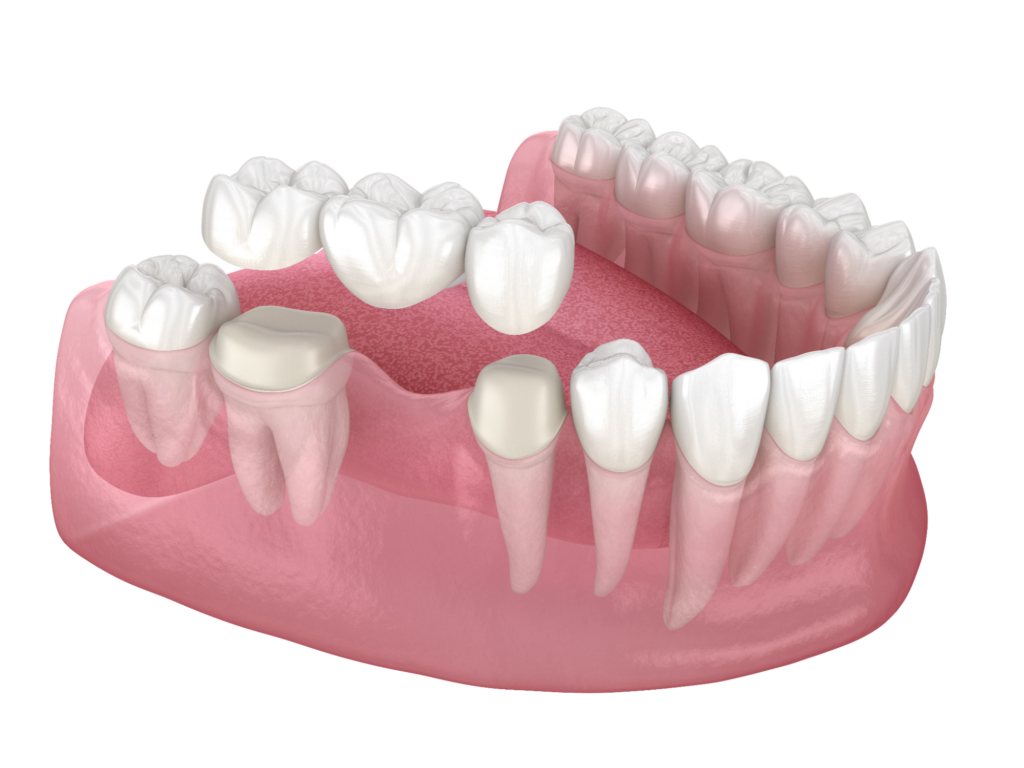Dental crowns have long been used to repair the appearance and function of a tooth that has been damaged.
These tooth-shaped caps aid in restoring your teeth and the enhancement of your smile.
When your dentist recommends a dental crown, you may have two questions: What types of dental crowns are there? And what are the benefits of a dental crown?
This quick guide will explain the different types of dental crowns and the pros and cons of each type.
Porcelain-Fused-to-Metal Crowns
A common form of dental crown is porcelain-fused-to-metal (PFM) crowns.
They give both strength and attractiveness (thanks to their metal structure and the porcelain coat that covers the cap).
Advantages of Porcelain-Fused-to-Metal Crowns
- They are both attractive and long-lasting.
- They’ve been around for more than half a century – We know they’re effective.
Disadvantages of Porcelain-Fused-to-Metal Crowns
- Because of the metal in these crowns, a grey line at the gum line may appear. This may not provide the same level of aesthetics as all-porcelain crowns.
- They are more expensive than porcelain crowns nowadays due to the increased prices of precious metals.
Metal & Gold Crowns
Copper and other metals, such as chromium or nickel, are used to make metal and gold crowns.
Because of their bold colour, gold crowns are not a common type of dental crown nowadays.
Advantages of Metal & Gold Crowns
- They have a lot of strength and are very resistant to wear.
- Only a small part of your natural tooth needs to be removed.
- They’re perfect for back dental restorations, especially second molars.
- Metal crowns rarely crack or break.
Disadvantages of Metal & Gold Crowns
- Aesthetic issues: They clearly do not resemble a real tooth.
- More expensive due to the increased price of precious metals nowadays.
Stainless Steel Crowns
Temporary dental crowns are constructed of stainless steel and are prefabricated rather than custom-made to ensure quick and easy insertion into the teeth.
As a result, they are more cost-effective than alternative dental crown materials because they do not require multiple trips to the dentist’s office.
Advantages of Stainless Steel Crowns
- They are durable, constructed of non-toxic metal, difficult to damage or remove, easy to clean, cover the entire tooth, and fit well.
- Stainless steel crowns are especially effective at preventing further decay in baby teeth.
- Stainless steel crowns will easily come out with baby teeth to make room for the adult teeth.
Disadvantages of Stainless Steel Crowns
- They can be easily noticed.
- Stainless steel is not as long-lasting as other metals.
Cosmetic Crowns (Ceramic)
This is without a doubt the most common form of crown nowadays. They are totally constructed of ceramic.
Advantages of Cosmetic Crowns
- Suitable for tissue.
- Good for people with hypersensitivity to metals.
- Reliable and long-lasting restoration.
- The crowns have a completely natural appearance and exactly match the patient’s natural teeth.
- They could be less expensive than other types of dental crowns, such as metal crowns and porcelain fused to metal crowns.
Disadvantages of Cosmetic Crowns
- They are not as durable as other types of dental crowns such as porcelain-fused-to-metal crowns but this gap has narrowed in recent years.
- They can wear down the teeth on the opposite side of the mouth more than metal or resin crowns.
All-Resin Crowns
The term “all resin” crown refers to a crown that is entirely comprised of a resin substance.
Resin is a blend of plastic-type components that are colour matched to the natural teeth. Resin crowns are also referred to as ‘composite resin’ crowns.
Advantages of All-Resin Crowns
- The most affordable choice out of all types of dental crowns.
- The installation of resin crowns normally takes only a few minutes.
Disadvantages of All-Resin Crowns
- For lost front teeth, resin crowns may be a better match.
- Resin dental crowns can deteriorate more quickly than porcelain or ceramic crowns.
Summary
The different types of dental crowns include all-resin, metal & gold, cosmetic crowns, stainless steel, and porcelain-fused-to-metal.
The benefits of a dental crown include an improved smile and durability. Dental crowns have a wide range of cosmetic and restorative uses. They are used both to support damaged teeth and to mask imperfections of deformed teeth.
We custom fabricate these porcelain caps to achieve the ideal size, shape and colour. Once we fix them on your teeth, they will go unnoticed in your smile as a whole, which will take you a step forward in terms of aesthetics – Call us today to book a consultation.


